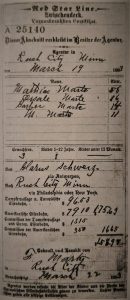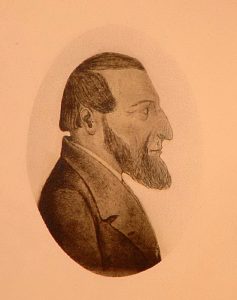 On Wednesday, September 20th, Joy and I met with a local Apostolic historian. In the interview, he explained to us that the first Apostolic to arrive in Morris, Chris Luthi (who happened to be his grandfather) was Swiss, not German as we (I) had previously been lead to believe. This explains why Apostolics are still commonly, and somewhat derogatorily, referred to as “Switzers” (prounounced swīt-z/er/). While it is true that Germans Apostolics did eventually begin migrating to Morris, this ignorance of migration origin sadly indicates a loss of personal history.
On Wednesday, September 20th, Joy and I met with a local Apostolic historian. In the interview, he explained to us that the first Apostolic to arrive in Morris, Chris Luthi (who happened to be his grandfather) was Swiss, not German as we (I) had previously been lead to believe. This explains why Apostolics are still commonly, and somewhat derogatorily, referred to as “Switzers” (prounounced swīt-z/er/). While it is true that Germans Apostolics did eventually begin migrating to Morris, this ignorance of migration origin sadly indicates a loss of personal history.
After meeting with Mr. Luthi, Joy and I went to the public library to check out their selection of state and local resources. It was there that we found the book, “They Chose Minnesota.” What a gem! It is loaded with information on nearly every ethnic group existing within our state’s borders. For our study, the chapters of greatest interest in this book include: The Mexicans, The Germans, and especially The Swiss. Perhaps it is just me, but when I read history books such as this one, it is easy to skim the through the facts (dates, names, maps) without grasping much of their significance. However, because we were so fortunate to receive a brief history on Apostolic Swiss before hand, the historical data in this chapter took on much greater meaning. Three points which I found particularly interesting, especially in conjunction with our study was that: 1. “Swiss emigration was not a result of overpopulation,” 2. “Emigration was stimulated by ‘American letters’,” and 3. there were “Government subsidies to remove poor people.1” As I read each of these statements I compared them to what we have already been told about Swiss history and I also considered how they applied to the emigration of the Apostolic peoples. It is unfortunately to think that previously, I probably would have passed over these ideas. To me, this reinforces the fact that Joy and I need to be diligent in bringing this history to life verses presenting dry facts.
This idea also rang true as I perused the the chapter,The Mexicans. Interestingly what immediately stood out to me was a reference to migrant workers following the Red River and Minnesota River in search of agricultural work2. Every study I have read on early Minnesota migration refers to the use of rivers as a means of land settlement. The concept of “water highways” is not new to me, however, while reading this section, its significance in our history and the pure uniqueness of the Minnesota landscape really struck me. We ARE the “Land of 10,000 Lakes”… 11,842 to be exact, 6,564 rivers and streams, and 10.6 million acres of wetlands. Even more interesting is that Minnesota’s waters flow outward in three different directions: north into Canada, east to the Atlantic, and south to the Gulf3. It is little wonder why our state has such a rich migration history.
Perhaps I’m being a little biased…
_________________________________________________________________________________
1deGryse, Louis M. “The Swiss.” In They Chose Minnesota, 211-219. St. Paul: Minnesota Historical Society Press, 1981.
2Diebold, Susan M. “The Mexicans.” In They Chose Minnesota, 92-107. St. Paul: Minnesota Historical Society Press, 1981.
3“Lakes, rivers, and wetlands facts.” Lakes, rivers and wetlands: Minnesota DNR, www.dnr.state.mn.us/faq/mnfacts/water.html. Accessed 25 Sept. 2017.

